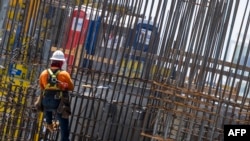A Mexican citizen taken into custody for allegedly driving without U.S. papers and transporting undocumented people was one of the first people to be arrested under Florida's controversial SB 1718, considered the most restrictive state law regarding migrants in the United States.
Police records identified the man as Raquel Lopez Aguilar, 41. The Florida Highway Patrol said he was behind the wheel of a white GMC Savana van when officers intercepted and apprehended him in Hernando County on August 21 after he crossed the state line from Georgia.
After determining that Lopez Aguilar did not have documents proving he was in the U.S. legally, the agents searched the van and discovered six undocumented passengers.
Undocumented migrants arrested in the United States and accused of no other crimes are typically detained temporarily and, depending on the circumstances, may be placed into so-called removal proceedings, leading to deportation.
But under Florida’s new law, which took effect July 1, the act of knowingly transporting undocumented individuals into the state — even by a member of their own family — has been elevated to felony human smuggling punishable by up to 15 years in prison.
Juan Sabines Guerrero, Mexico’s consul general in Orlando, listed a chronology of events leading to the Mexican migrant’s arrest in a September 3rd English-language post on X, formerly known as Twitter.
"Raquel, who tells us that he was not driving, is arrested and charged with 5 counts of smuggling for crossing from Georgia to Florida without papers,” the post said. He wrote that the Mexican government had secured a lawyer for Lopez Aguilar, who has a court hearing set for September 21, and will pay for his legal expenses.
"We firmly believe that Raquel will be free in less than a month," added Sabines Guerrero, who has hinted that the traffic stop that resulted in the man’s arrest may have been racially motivated.
The police report said the vehicle was stopped because it “had obviously darker than legal window tint on the windows behind the driver. Additionally, the windshield had several large cracks obstructing the view of the driver.”
But Sabines Guerrero wrote on X, “Perhaps it was not the color of the glass but the color of his skin that motivated the police to stop him."
Law called 'authoritarian’
SB 1718 applies only in Florida, a favored destination for migrants traveling from Latin America and other parts of the world.
Besides the provision on transporting undocumented individuals into Florida, the law also invalidates out-of-state driver’s licenses issued to undocumented individuals from some states, imposes stricter employment verification requirements and stiffer penalties for those who don’t comply with the mandates, and allocates millions of dollars to bus migrants out of the state.
Under another provision of SB 1718, businesses employing more than 25 workers must use the E-Verify system to confirm the legal status of new hires or face potential fines. E-Verify is a federal government database with which employers can confirm that a candidate is eligible to work in the United States.
The law also requires hospitals to submit quarterly reports to state government about any undocumented patients they treat. According to Governor Ron DeSantis, this provision is intended to keep records of state resources spent on unauthorized immigrants.
DeSantis, a Republican 2024 presidential candidate, signed SB 1718 into law in May, presenting it as a necessary response to what he cast as a failure by the Democratic administration of President Joe Biden to control illegal immigration into the United States.
“In Florida, we will not stand idly by while the federal government abandons its lawful duties to protect our country,” he said in May. He said the legislation “gives Florida the most ambitious anti-illegal-immigration laws in the country, fighting back against reckless federal government policies and ensuring the Florida taxpayers are not footing the bill for illegal immigration.”
Even before SB 1718 passed, civil liberties organizations criticized it as the most restrictive anti-immigration law in the country.
"During 15 years of my life, I was undocumented. I know exactly what it feels like to fear not knowing what is going to happen when you get in your car and go to work, to school or to pick up a child," said Felipe Sousa, an immigrant from Brazil who arrived in the U.S. when he was 14.
“I understand the fear that millions of people in our communities feel. We must also know that we have civil rights,” said Sousa, who is now the director of the Hope Community Center in the Orlando area.
Federal lawsuit
A coalition led by the Florida chapter of the American Civil Liberties Union sued DeSantis and several other state officials in U.S. District Court in July, challenging the constitutionality of the provision in the law that criminalizes the transportation of individuals into Florida.
The plaintiffs included the ACLU, Americans for Immigrant Justice, the American Immigration Council and the Southern Poverty Law Center, who said they were acting on behalf of the Florida Farmworkers Association and various individuals, including U.S. citizens and undocumented drivers and passengers.
In a statement accompanying the filing, the ACLU said that SB 1718 and its provisions “harm Florida immigrants and their families and seek to target and intimidate immigrant families in every facet of their lives.”
But state Senator Blaise Ingoglia, one sponsor of the law, has hailed it as "the strongest state-led anti-illegal-immigration bill ever brought forth.”
“It was an honor to usher this bill through the process, knowing we are safeguarding Floridians and serving as the model for the nation to combat this crisis created by our very own president,” Ingoglia said.
Some business leaders are worried about the impact the legislation will have on the many Florida industries that rely heavily on immigrant labor.
The agriculture, construction and hospitality sectors are especially vulnerable, according to Samuel Vilchez Santiago, Florida director of the American Business Immigration Coalition, which advocates for immigration reform that benefits businesses.
"These are industries where immigrants make up the vast majority of workers, and not allowing businesses to be able to utilize these workers will have a really big impact on our economy and their ability to create jobs," Vilchez said in a late May interview with National Public Radio.
A vanishing dream
Florida’s immigrant community is feeling the impact of the restrictive legislation.
Many field workers like Rogelio Elias received termination letters from their employers in July.
“They told me it was because of the papers, that the owner of the company was afraid of losing his license if they found out he had people working illegally," he said.
"I hope Ron DeSantis repents, opens his eyes, his mind and his brain to help us, because we do pay taxes and make a difference," Guatemalan migrant Lucia Quie said during a protest against SB 1718 in Homestead, a city south of Miami.
Quie, who has worked for more than 20 years in the agriculture industry while caring for her two daughters, expressed deep concern about the potential repercussions of the law. She said she wanted to see the law revoked because she believes that "without tourism, construction and agriculture, Florida would not exist."
The impact of the law is evident in Homestead, once a refuge for migrants. At one of South Florida's busiest flea markets, predominantly frequented by Latin American customers, foot traffic has significantly declined since July.
"It's gone down too much — about 70 or 80 percent. The reason? Because many have left," said Sandra Aguilar, a flea market vendor.
VOA reporters Antoni Belchi, Jose Pernalete and Aline Barros contributed to this report.













